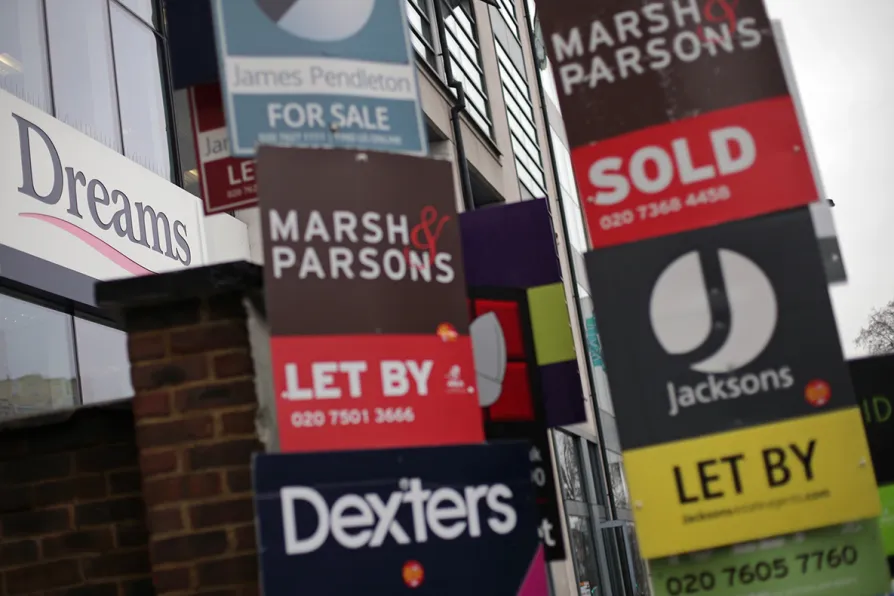John Wojcik pays tribute to a black US activist who spent six decades at the forefront of struggles for voting rights, economic justice and peace – reshaping US politics and inspiring movements worldwide
Our housing crisis isn’t an accident – it’s class war, trapping millions in poverty while landlords and billionaires profit. To solve it, we need comprehensive transformation, not mere tokenistic reform, writes BECK ROBERTSON

 Various For Sale, Sold and Let By estate agent signs juxtaposed next to a Dreams store in Clapham, London
Various For Sale, Sold and Let By estate agent signs juxtaposed next to a Dreams store in Clapham, London
BRITAIN’S current housing emergency isn’t a tragic accident, nor is it an unfortunate byproduct of administrative or political mismanagement. It’s a deliberately designed system of exclusion and extraction, a machine built to funnel wealth upwards, while keeping the working class trapped in precarity and fear.
According to data released by the Office for National Statistics, private rents rose by 4.2 per cent last year, while wages stagnated. The official narrative placed the blame squarely on market forces and housing shortages, but the truth is simpler — and uglier: landlords, developers and the political elite have collectively engineered a landscape where secure housing has become a luxury for the many.
For freelancers, carers, single parents, and working-class people alike, essentials such as housing, income and ID are being withheld by design.
Bureaucratic hurdles like our broken ID system have become a maze that’s impossible for some to navigate, locking thousands out of housing registers, universal credit and employment. The labyrinth is intentional, it’s a mechanism to ensure poverty becomes permanent.
For those placed in temporary accommodation, escape is frequently beyond the bounds of achievability. Councils are legally obliged to house homeless people deemed in “priority need,” but chronic underfunding and sell-offs mean there’s nowhere to move them on to.
People are placed in hostels and B&Bs run by private firms at enormous public cost, to the tune of £1.7 billion annually, according to homeless charity Shelter. These spaces are only meant to be short-term, yet many families and individuals languish there for months, or even years, often without kitchens, adequate heating, or any security.
The barriers to exit are systemic. Private landlords still consistently refuse tenants on benefits, while social housing waiting lists stretch into the decades — and councils are ill-equipped to build or acquire new homes at scale. Meanwhile, temporary accommodation providers profit from each night of a person’s entrapment, incentivising inertia rather than resolution. As Shelter put it, “temporary accommodation has become a billion-pound black hole in our housing system.”
British homelessness charity Crisis states that rough sleeping has risen by 37 per cent since 2010, while nationwide emergency food service Trussell Trust declared that foodbank use has also reached record highs, with over 2.6 million food parcels distributed last year. This epidemic of poverty is not caused by scarcity, but spurred by distribution. While luxury flats sit empty as speculative assets for billionaires, families with children are being warehoused in mould-infested rooms, forced to rely on foodbanks.
Behind all this runs a narrative that paints the poor as undeserving or incompetent, a convenient myth that continues to justify the ongoing economic violence. The structural reality is that Britain is sliding into Feudalism 2.0, where housing is becoming the new serfdom and survival depends on who holds the keys.
Nearly half of the world’s wealth is now concentrated in the hands of the top 1 per cent. In Britain, billionaire landlords and developers enjoy tax loopholes and political patronage, allowing them to hoard homes as investments while homelessness rates continue to rise. Councils are selling off social housing under the guise of “regeneration,” displacing tenants and destroying communities. “Right to buy” schemes decimated council housing stock without providing any replacement, leaving waiting lists reaching into years and even decades.
For single parents or freelancers, the system has become an impasse. Freelance workers are punished for their irregular income by letting agents, who demand to see years of payslips. Single parents are treated as high-risk tenants, despite often being the backbone of their communities, juggling both work and unpaid care.
Those reliant on benefits frequently face “No DSS” discrimination, which is technically illegal but still is widespread. Carers holding up our NHS and social care systems, are relegated to the most precarious corners of the market. The message is clear — if you’re not wealthy, salaried and fully documented, you don’t deserve a safe home.
This system’s not broken, it’s functioning exactly as intended, keeping the working class in constant fear of eviction and destitution. It’s structural capitalist violence — landlords accumulate passive income, as political parties receive donations from the property sector.
The solution’s not mere tokenistic reform but transformative, sweeping change. Too many political leaders have made empty pledges about creating more “affordable” housing, a term which has become so corrupted, it often means homes that are only marginally cheaper than current market rates.
Instead, politicians should introduce rent caps like those implemented in Berlin and Vienna, alongside a programme of social housing construction that’s publicly owned and democratically managed. Section 21 “no-fault” evictions must be abolished, while tighter regulation of short-term lets that decimate local rental supply is urgently overdue.
There’s also a need to overhaul Britain’s housing ID system, so that a lack of documents doesn’t translate into barriers to shelter.
Solving Britain’s housing nightmare means recognising housing as a fundamental human right, not a commodity. No society that lets children grow up in homeless hostels, while billionaires collect rental income on empty flats, can call itself civilised. The housing struggle is a class struggle and only once we recognise that the present situation is by political design, can we begin to organise for something better.

Building is the solution for much of our housing crisis – and will also help to address poverty, ill health, and even anti-social behaviour and alienation, writes KENNY MacASKILL












